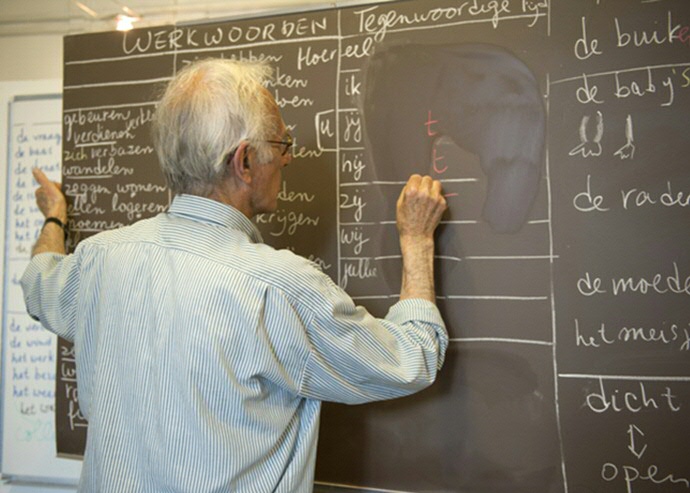No critical period for learning grammar

Linguists of the University of Groningen and the University of Essex reveal new insights to brain processes in learners of a second language, which argue against the existence of a critical period for learning grammar. The researchers demonstrate this using a new analysis method of the EEG signal., a measurement of brainwaves. The results were published in the Open Access journal PLoS ONE.
Critical period?
It is a well-established finding that learners who start learning a new language at an early age have a better shot at fully mastering this language than older learners. The crucial question is whether this age effect is caused by a language-specific ‘critical period’, that is, a certain age limit before one has to start learning a second language in order to be able to reach the same level as a native speaker. The idea behind such a critical period is a limited time-window during which the brain is receptive for learning a second language. To determine whether a critical period exists, the relationship between the starting age of learning a second language and the level that can be attained is investigated. If the attained level gradually diminishes for older learners, this does not support a critical period; however, if there is a sudden drop around a certain age, this would be evidence for its existence.
The later, the harder
The study shows that when certain grammatical rules in the second language are different from the native language, it becomes more difficult to get the hang of these rules as one starts to learn the new language at a later age. Whereas the brain response to a grammatical error in a person who started learning in their teens is virtually indistinguishable from that of a native speaker, a learner who started in their thirties appears to show a completely different brain response. However, this change is not abrupt, but gradual, and it therefore seems unlikely that a clearly-defined time-window exists for learning a second language.
New method
Additionally, this study emphasizes the importance of using analysis methods that investigate all data simultaneously, eliminating the necessity for averaging and creating artificial groups. Because of the richness of EEG data, traditional analysis methods are based on subsets of the data derived by repeated averaging. This results in a loss of detail. In the current study the researchers show that a traditional analysis of their research results would result in the acceptance of the presence of a critical period. However, when the data are analyzed by means of a new statistical technique, generalized additive modeling, there seems to be no question of a critical period. The reason for the differences in the conclusion is that with generalized additive modeling learners do not have to be classified into groups based on the age at which they begin to learn the second language (for example, below or above age twelve). Instead, the precise effect of the starting age can be determined. At the same time, repeated averaging is not required, as all data can be analyzed simultaneously. This also means that with this technique the course of the brain signal over time can be taken along in the analysis.
This research was supported by the Netherlands Organization for Scientific Research (NWO) under grant 016.104.602 (VICI), awarded to Monika S. Schmid.
Reference
Nienke Meulman, Martijn Wieling, Simone A. Sprenger, Laurie A. Stowe, Monika S. Schmid, ' Age effects in L2 grammar processing as revealed by ERPs and how (not) to study them',
PLoS ONE, December 18th 2015.
More information
For more information you can contact Nienke Meulman, n.meulman rug.nl , + 31 50 363 2133 / + 31 50 363 9456.
More news
-
19 January 2026
Digitization can leave disadvantaged citizens in the lurch
-
13 January 2026
Doing good in complex situations
